Day 4: Stormin' Ft Sumter
Main Page >
2007 Havin' Fun on US 1
Despite the orgy of margies, Mike and Bone arose
early with their sites set on touring the beginning of the Civil War, Fort Sumter, and then to trek south to
smarmy Savannah !!
The start of a Hot Day in Market Square !!
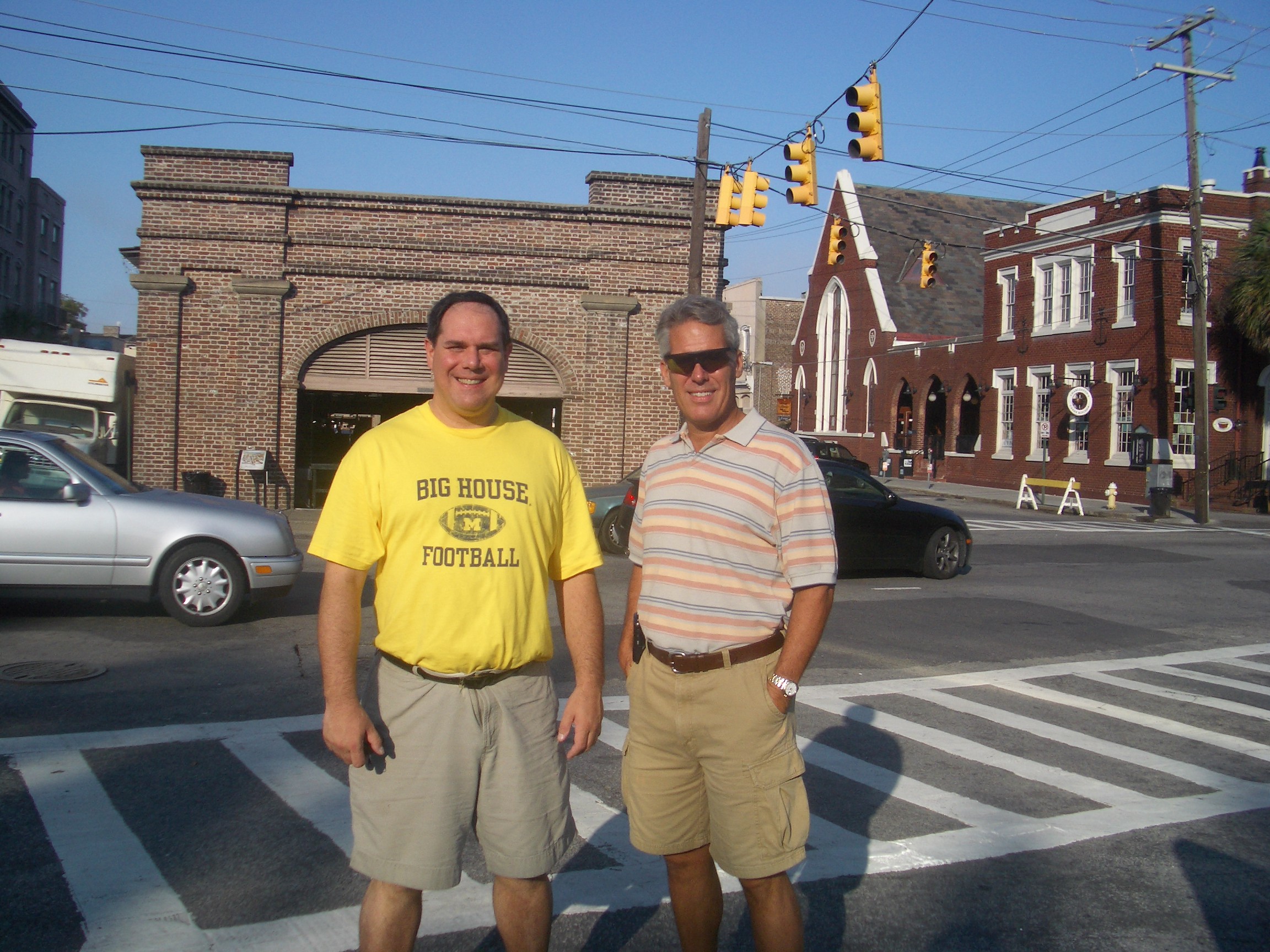
At 9:00 in the morning it was ALREADY a sizzling 90 degrees and 90 percent
humidity !! Uncomfortable but intrigued the Boys wandered through the beautiful
streets from the colonial times of Charleston !!
Beauties of the Battery !!
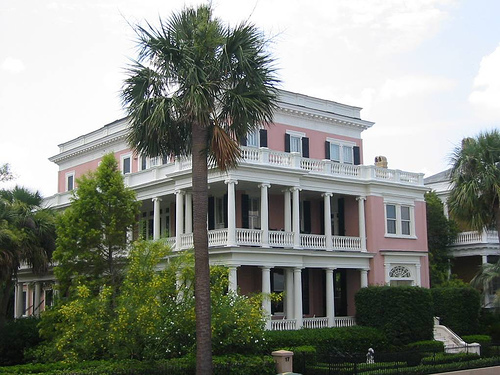
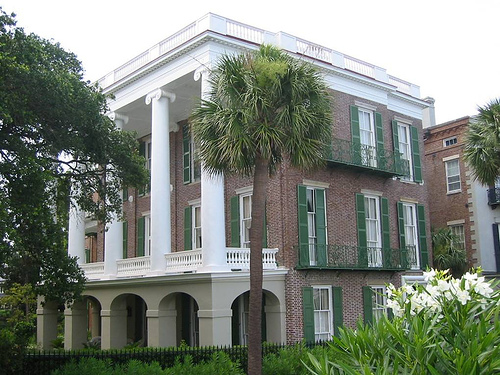
Sailing to Sumter
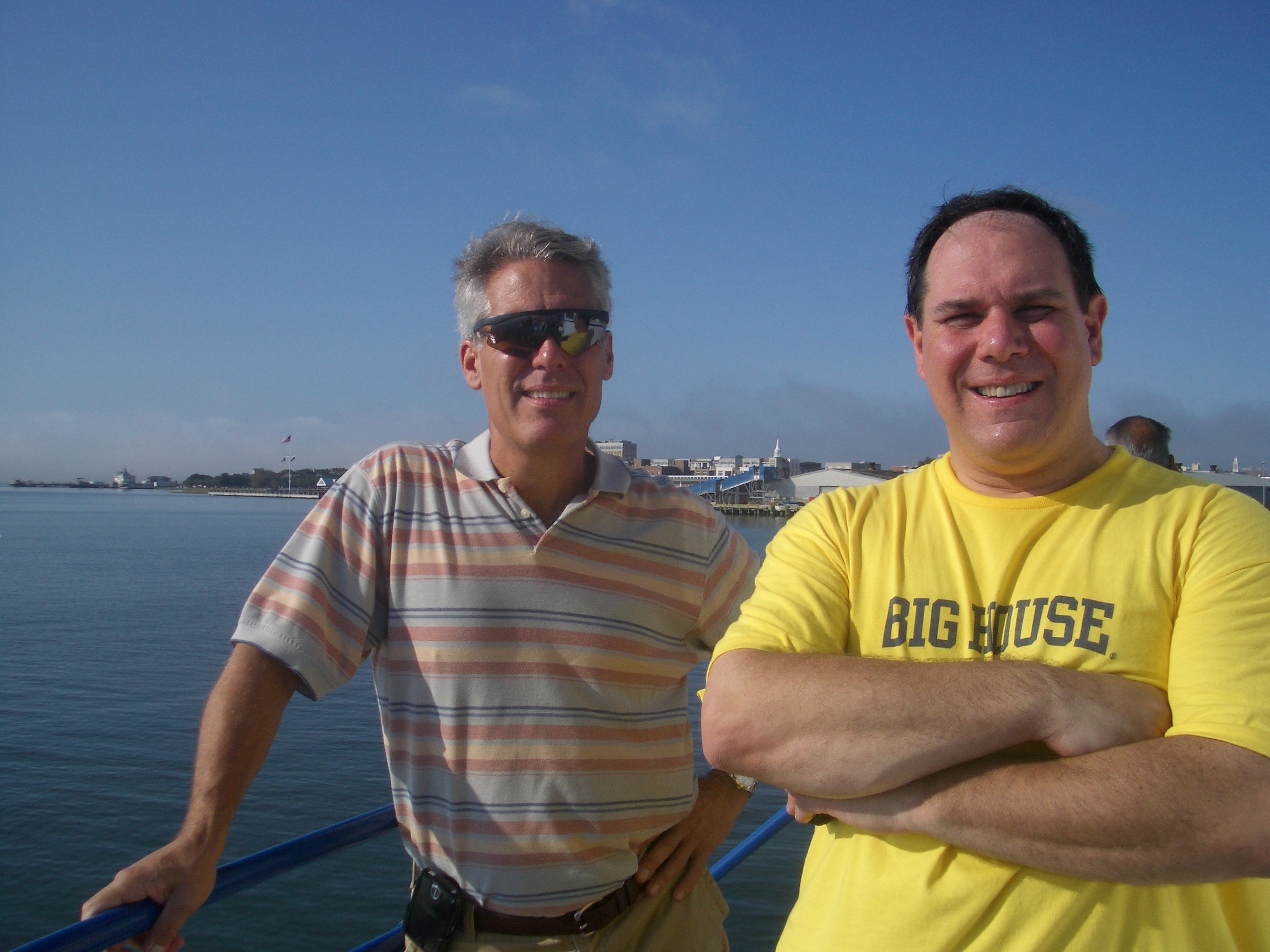
Mike and Bone enjoyed the reprieve from the
heat and the humidity of Charleston when they left port and sailed out into the
Harbor. Once they landed onto Fort Sumter, National Park Rangers gathered the
crow to share the story of what and why the Civil War started at Fort
Sumter!
Why did the Civil
War start in Charleston?!!!
Before the Civil War
Charleston had always been a hotbed of
pro-slavery, anti-union behavior dating back to when Charlestonian John C.
Calhoun attempted to have South Carolina leave the union in 1837 with the
Nullification Ordinance. However President Andrew Jackson threatened both
Federal Troops and a noose for Calhoun which quelled the "noise" for a few years.
However on December 20, 1860, the South Carolina General Assembly made the
state the first to ever secede from the Union. The cause was the election to the
presidency of a man "whose opinions and purposes are hostile to slavery".
This caused US. General Robert Anderson to move his Federal Troops on December
26th to the incomplete Fort Sumter in the middle of the Charleston Harbor.
Anderson's position grew very dangerous when Confederate gun fire stopped his
relief ship the "Star of the West" from getting into the harbor. It the Harbor
and Fort Sumter that was the next stop for the already hot and sweaty Boys from
the North and their “War of Nawthen Aggression”!
Invading Fort Sumter !!
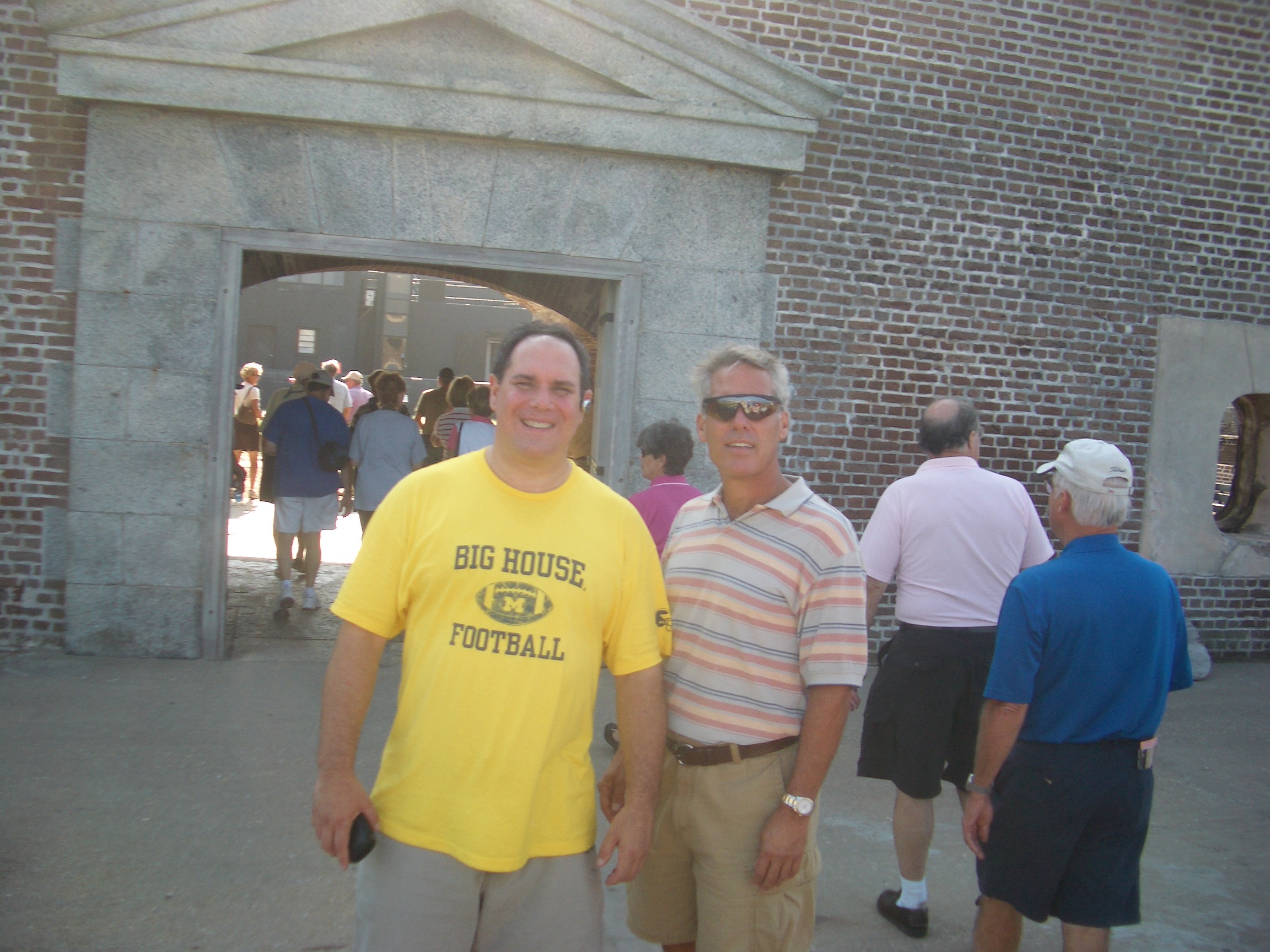
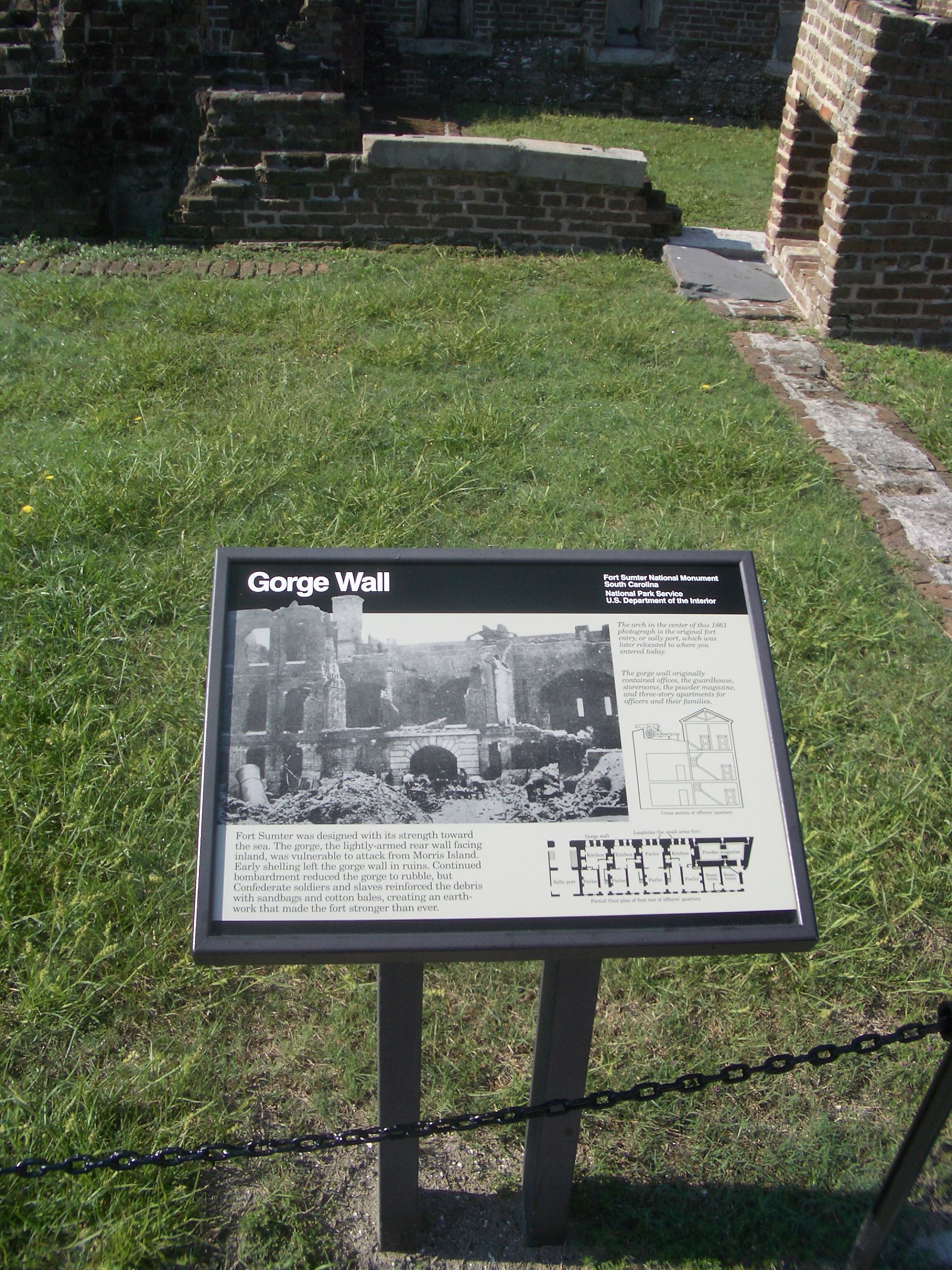
With the secession of South Carolina
having dissolved her connection with the government of the
United States, the question of the possession
of the forts in the harbor and of the military post at the arsenal became at
once a question of vital interest to the State. South Carolina sent commissioners
to negotiate with
Washington
for an amicable settlement of this important question, and other questions
growing out of the new relation which South Carolina
bore to the Union.
Pending the action of the
commissioners in Washington, Major Robert Anderson, who commanded the
Federal troops stationed in the harbor moved his troops from Fort Moultrie on
the shore, to Ft Sumter in the Harbor. This compelled the return of the
commissioners and led to the most serious complications. An understanding had
been established between the authorities in Washington and the members of
Congress from South Carolina, that the forts would not be attacked, or seized as
an act of war, until proper negotiations for their cession to the State had been
made and had failed; provided that they were not reinforced, and their military
status should remain as it was at the time of this understanding, viz., on
December 9, 1860.
Mike Surveying the Scene
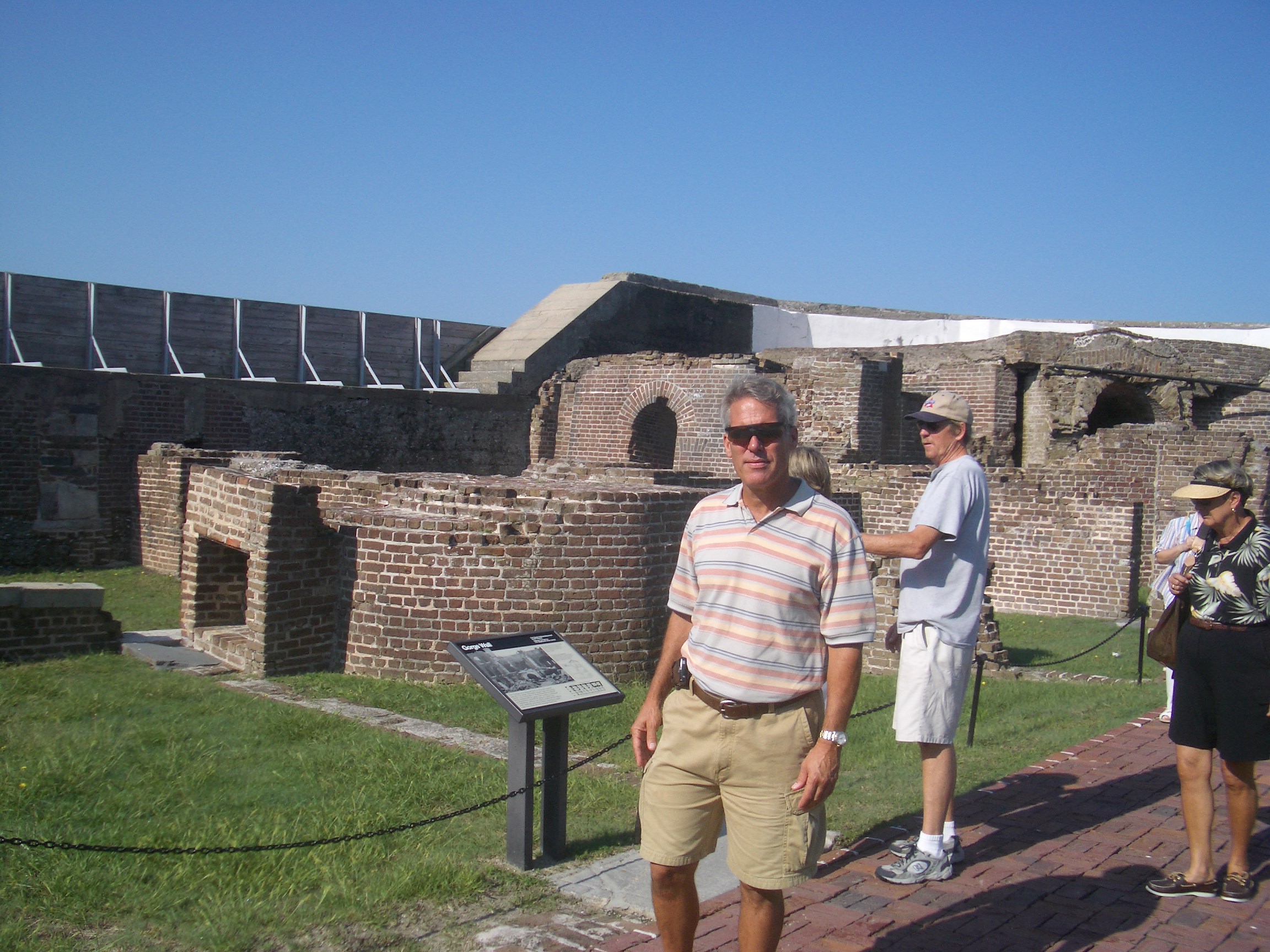
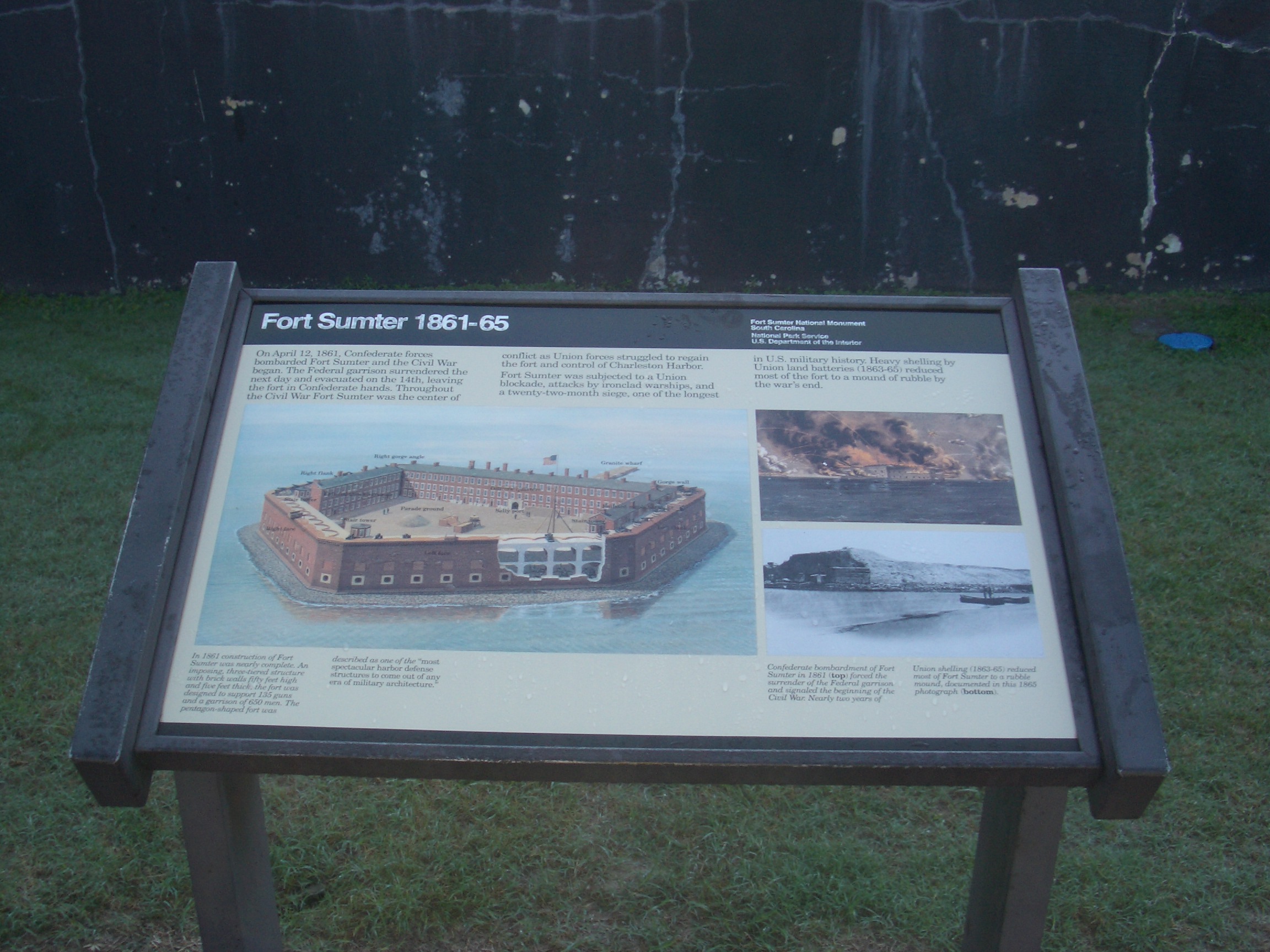
Fort
Sumter, in the very
mouth of the harbor, was in an unfinished state and without a garrison. On the
night of the 26th of December, 1860,
Maj. Robert Anderson dismantled Fort
Moultrie and removed his command by
boats over to Fort
Sumter. The following account of the effect of this
removal of Major Anderson upon the people, and the action of the government, is
taken from Brevet Major-General Crawford's "Genesis of the Civil War." General
Crawford was at the time on the medical staff and one of
Anderson's officers. His book is a clear and admirable
narrative of the events of those most eventful days, and is written in the
spirit of the utmost candor and fairness. In the conclusion of the chapter
describing the removal, he says:
The fact of the evacuation of
Fort
Moultrie by Major Anderson was soon
communicated to the authorities and people of Charleston,
creating intense excitement. Crowds collected in streets and open places of the
city, and loud and violent were the expressions of feeling against Major
Anderson and his action. On the morning of the 27th, he
dispatched his aide-de-camp, Col. Johnston Pettigrew, of the First South
Carolina Rifles, to Major Anderson. Arriving at Fort
Sumter, Colonel Pettigrew and his companion were ushered into the
Fort. The feeling was reserved and formal, when, after declining seats, Colonel
Pettigrew immediately opened his mission: "Major Anderson," said he, "can I
communicate with you now, sir, before these officers, on the subject for which I
am here?" "Certainly, sir," replied Major Anderson, "these are all my officers;
I have no secrets from them, sir." The commissioner then informed Major Anderson
that he was directed to say to him that the governor was much surprised that he
had reinforced "this work." Major Anderson promptly responded that there had
been no reinforcement of the work; that he had removed his command from
Fort
Moultrie to
Fort
Sumter, as he had a right to do,
being in command of all the forts in the harbor. To this Colonel Pettigrew
replied that when the present governor (Pickens) came into office, he found an
understanding existing between the previous governor (Gist) and the President of
the United States, by which all property Within the limits of the State was to
remain as it was; that no reinforcements were to be sent here, particularly to
this post; that there was to be no attempt made against the public property by
the State, and that the status in the harbor should remain unchanged. He was
directed also to say to Major Anderson that it had been hoped by the governor
that a peaceful solution of the difficulties could. have been reached, and a
resort to arms and bloodshed might have been avoided; but that the governor
thought the action of Major Anderson had greatly complicated matters, and that
he did not now see how bloodshed could be avoided; that he had desired and
intended that the whole matter might be fought out politically and without the
arbitration of the sword, but that now it was uncertain, if not impossible.
Seeing through the Gate
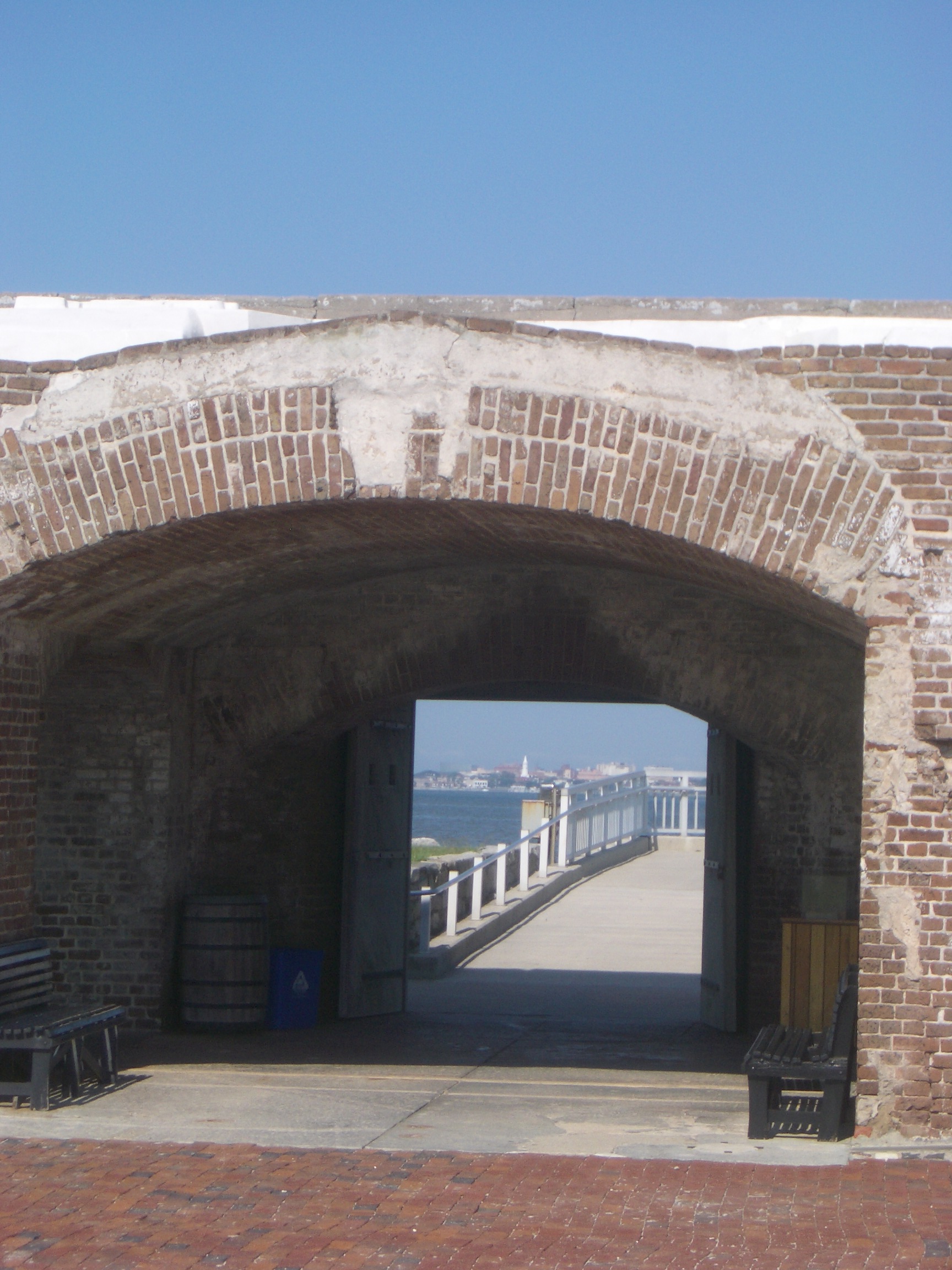
To this Major Anderson replied, that as far as any understanding
between the President and the governor was concerned, he had not been informed;
that he knew nothing of it; that he could get no information or positive orders
from Washington, and that his
position was threatened every night by the troops of the State. He was then
asked by Major Capers, who accompanied Colonel Pettigrew, "How?" when he
replied, "By sending out steamers armed and conveying troops on board ;" that
these steamers passed the fort going north, and that he feared a landing on the
island and the occupation of the sand-hills just north of the fort; that 100
riflemen on these hills, which commanded his fort, would make it impossible for
his men to serve their guns; and that any man with a military head must see
this. "To prevent this," said he earnestly, "I removed on my own responsibility,
my sole object being to prevent bloodshed." Major Capers replied that the
steamer was sent out for patrol purposes, and as much to prevent disorder among
his own people as to ascertain whether any irregular attempt was being made to
reinforce the fort, and that the idea of attacking him was never.. entertained
by the little squad who patrolled the harbor.
Major Anderson replied to this that he was wholly
in the dark as to the intentions of the State troops, but that he had reason to
believe that they meant to land and attack him from the north; that the desire
of the governor to have the matter settled peacefully and without bloodshed was
precisely his object in removing his command from Moultrie to Sumter; that he
did it upon his own responsibility alone, because he considered that the safety
of his command required it, as he had a right to do. "In this controversy," said
he, "between the North and the South, my sympathies are entirely with the South.
These gentlemen," said he (turning to the officers of the post who stood about
him), "know it perfectly well." Colonel Pettigrew replied, "Well, sir, however
that may be, the governor of the State directs me to say to you courteously but
peremptorily, to return to Fort
Moultrie." "Make my compliments to the governor
(said Anderson) and say to him that I decline to accede to his request; I cannot
and will not go back." "Then, sir," said Pettigrew, "my business is done," when
both officers, without further ceremony or leave-taking, left the fort.
Colonel Pettigrew and Major Capers returned to the city and
made their report to the governor and council who were in session in the council
chamber of the city hall. That afternoon Major Anderson raised the flag of his
country over Sumter, and went
vigorously to work mounting his guns and putting the fort in military order.
Bone guarding a cannonball in the Wall !!
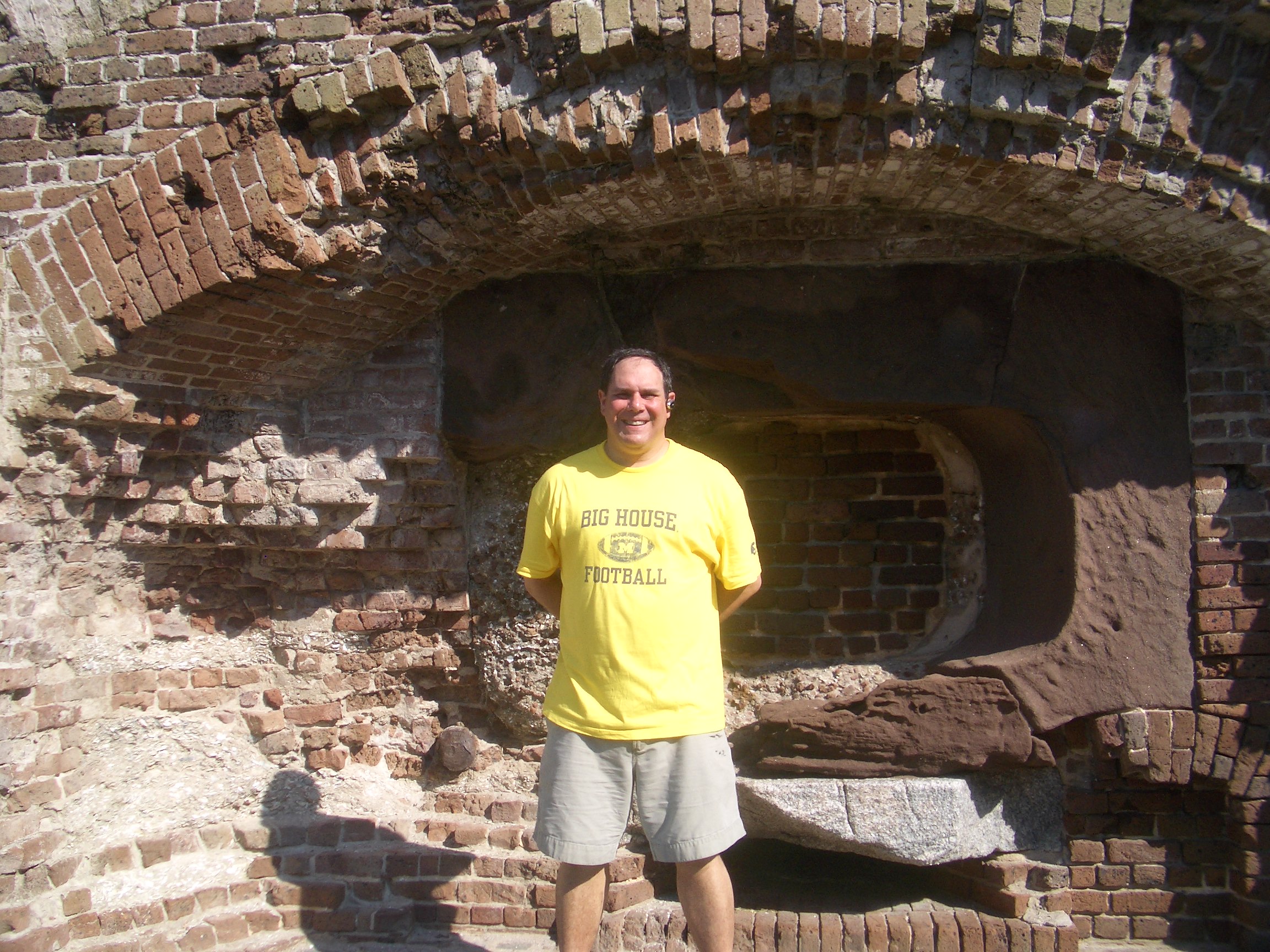
Repeated demands having been made upon Major Anderson, and
upon the President, for the relinquishment of Fort
Sumter, and these demands having
been refused and the government at Washington
having concluded to supply and reinforce the fort by force of arms, it was
determined to summon Major Anderson to evacuate the fort, for the last time.
Accordingly, on April 11th, General Beauregard sent him the following
communication:
Headquarters Provisional
Army, C. S. A.
Charleston,
April 11, 1861.
Sir: The government of the
Confederate States has hitherto foreborne from any hostile
demonstrations against
Fort
Sumter,
in hope that the government of the
United States, with a
view to the amicable adjustment of all questions between the two governments,
and to avert the calamities of war, would voluntarily evacuate it. There
was reason at one time to believe that such would be the course pursued by the
government of the United States,
and under that impression my government has refrained from making any demand for
the surrender of the fort. But the Confederate States can no longer delay
assuming actual possession of a fortification commanding the entrance of one of
their harbors and necessary to its defense and security.
I am ordered by the government
of the Confederate States to demand the evacuation of
Fort
Sumter.
My aides, Colonel Chestnut and Captain Lee, are authorized to make such demand
of you. All proper facilities will be afforded for the removal of yourself and
command, together with company arms and property, and all private property, to
any post in the United States
which you may select. The flag which you have upheld so long and with so much
fortitude, under the most trying circumstances, may be saluted by you on taking
it down. Colonel Chestnut and Captain Lee will, for a reasonable time, await
your answer.
I am, very respectfully, your obedient servant,
G. T. BEAUREGARD,
Brigadier-General Commanding.
Major Anderson replied as follows:
Fort Sumter, S.C.,
April 11, 1861.
General: I have the honor to acknowledge the receipt
of your communication demanding the evacuation of this fort, and to say, in
reply thereto, that it is a demand with which I regret that my sense of honor,
and of my obligations to my government, prevent my compliance. Thanking you for
the fair, manly and courteous terms proposed, and for the high compliment paid
me,
I am, General, very respectfully, your obedient
servant,
ROBERT ANDERSON,
Major, First Artillery, Commanding.
Major Anderson, while conversing with the
messengers of General Beauregard, having remarked that he would soon be starved
into a surrender of the fort, or words to that effect, General Beauregard was
induced to address him a second letter, in which he proposed that the major
should fix a time at which he would agree to evacuate, and agree also not to use
his guns against the Confederate forces unless they fired upon him, and so
doing, he, General Beauregard, would abstain from hostilities. To this second
letter Major Anderson replied, naming noon on the 15th, provided that no hostile
act was committed by the Confederate forces, or any part of them, and provided,
further, that he should not, meanwhile, receive from the government at
Washington controlling instructions or additional supplies.
The fleet which was to reinforce and supply him
was then collecting outside the bar, and General Beauregard at once notified
him, at 3:20 a. m. on the morning of the 12th of April,
that he would open fire on the fort in one hour from that time.
The shell which opened the momentous bombardment of
Fort Sumter was fired
from a mortar, located at Fort
Johnson on James island, at 4:30 on the morning of the 12th.
Sumter's savaged Walls
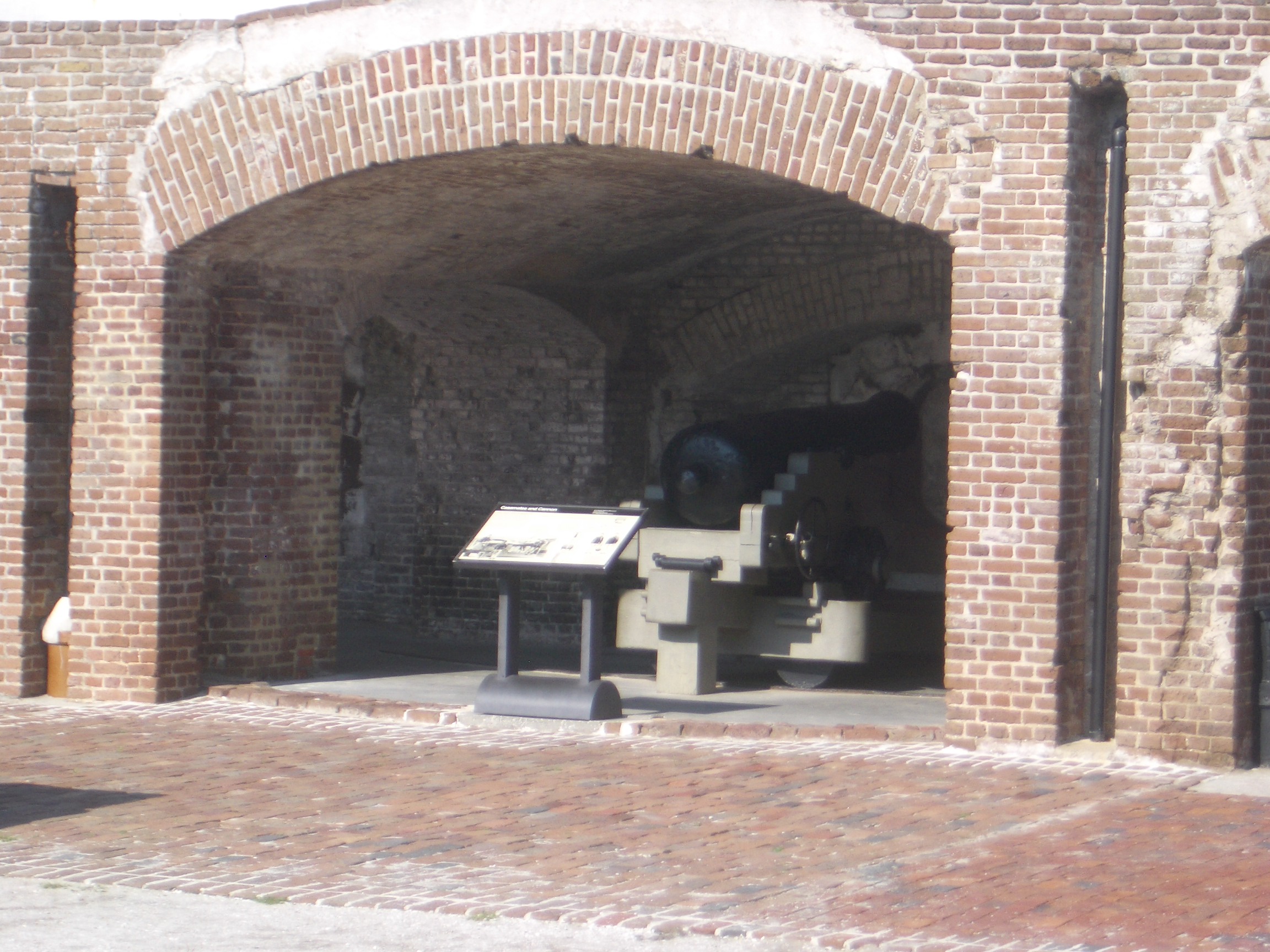
For thirty-four hours they assaulted
Sumter
with an unceasing bombardment, before its gallant defenders consented to give it
up, and not then until the condition of the fort made it impossible to continue
the defense. Port Moultrie
alone fired 2,490 shot and shell. Gen. S. W. Crawford, in his accurate and
admirable book, previously quoted, thus describes the condition of
Sumter
when Anderson agreed to its
surrender:
"It was a scene of ruin and destruction. The
quarters and barracks were in ruins. The main gates and the planking of the
windows on the gorge were gone; the magazines closed and surrounded by
smouldering flames and burning ashes; the provisions exhausted; much of the
engineering work destroyed; and with only four barrels of powder available. The
command had yielded to the inevitable. The effect of the direct shot had been to
indent the walls, where the marks could be counted by hundreds, while the
shells, well directed, had crushed the quarters, and, in connection with hot
shot, setting them on fire, had destroyed the barracks and quarters down to the
gun casemates, while the enfilading fire had prevented the service of the
barbette guns, some of them comprising the most important battery in the work.
The breaching fire from the columbiads and the rifle gun at Cummings point upon
the right gorge 'angle, had progressed sensibly and must have eventually
succeeded if continued, but as yet no guns had been disabled or injured at that
point. The effect of the fire upon the parapet was pronounced. The gorge, the
right face and flank as well as the left face, were all taken in reverse, and a
destructive fire maintained until the end, while the gun carriages on the
barbette of the gorge were destroyed in the fire of the blazing quarters."
The spirit and language of General Beauregard in
communicating with Major Anderson, and the replies of the latter, were alike
honorable to those distinguished soldiers. The writer, who was on duty on
Sullivan's island, as major of Pettigrew's regiment of rifles, recalls vividly
the sense of admiration felt for Major Anderson and his faithful little command
throughout the attack, and at the surrender of the fort. "While the barracks in
Fort Sumter were in a blaze," wrote General Beauregard to the secretary of war
at Montgomery, "and the interior of the work appeared untenable from the heat
and from the fire of our batteries (at about which period I sent three of my
aides to offer assistance), whenever the guns of Fort Sumter would fire upon
Moultrie, the men occupying the Cummings point batteries (Palmetto Guard,
Captain Cuthbert) at each shot would cheer Anderson for his gallantry, although
themselves still firing upon him; and when on the 15th instant he left the
harbor on the steamer Isabel, the soldiers of the batteries lined the beach,
silent and uncovered, while Anderson and his command passed before them."
Thus closed the memorable and momentous attack
upon Fort
Sumter by the forces of
South Carolina, and thus began the war which lasted
until April, 1865, when the Southern Confederacy, as completely ruined and
exhausted by fire and sword as Fort
Sumter
in April, 1861, gave up the hopeless contest and reluctantly accepted the
inevitable.
The Boys wandered the wreck of the Fort observing
the damage that is still visible and cannonballs that are stuck in the wall.
Eventually they wandered into the Museum to check out the artifacts of the Fort
The South Carolina Palmetto Flag
(Raised after the Surrender)
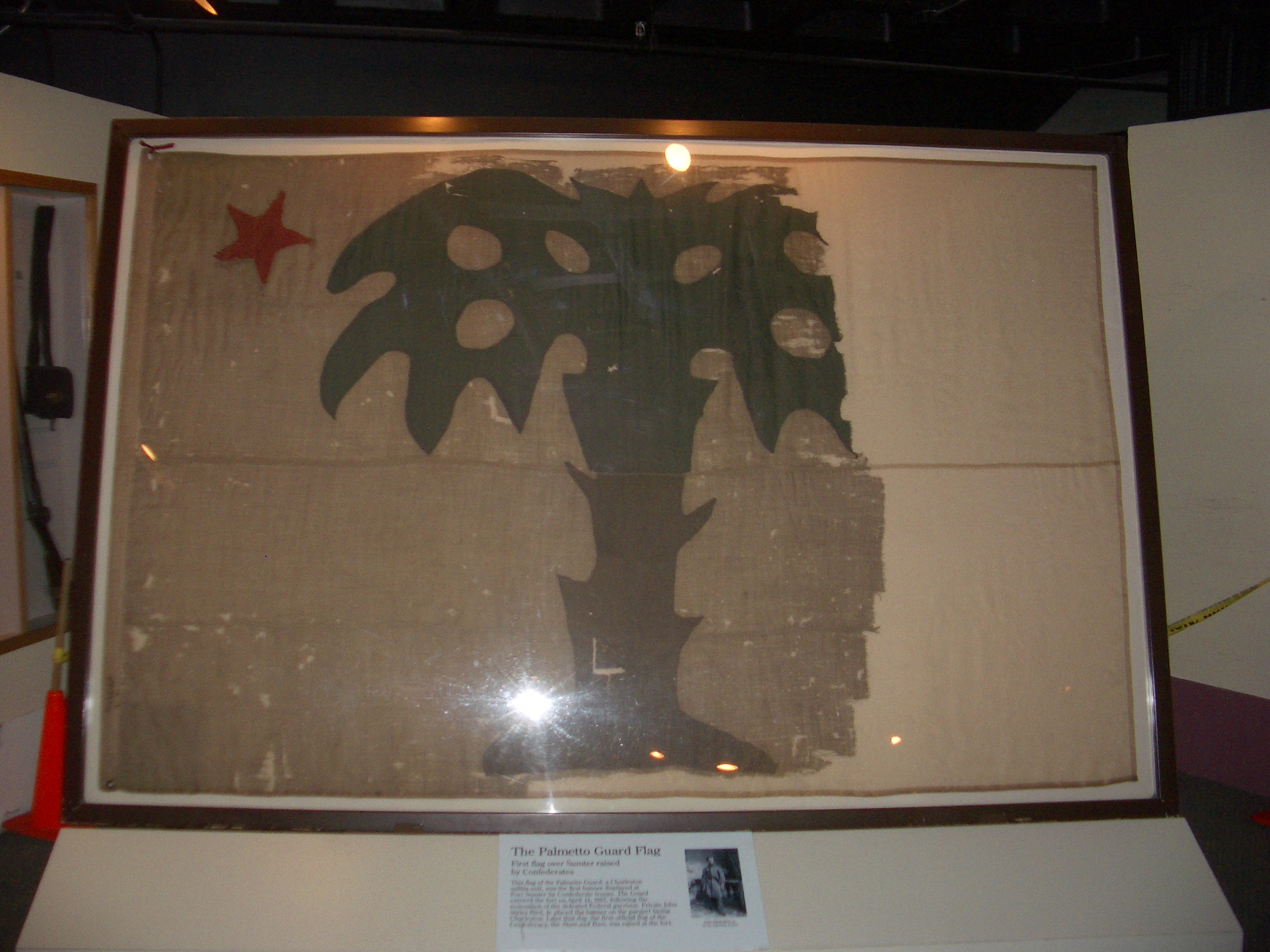
The Museum displays had a VERY Southern sympathy
bent to them, which was interesting considering that it is a National Park.
Apparently their are those who still believe that the South shall rise again
!!!!
The US Sumter Flag
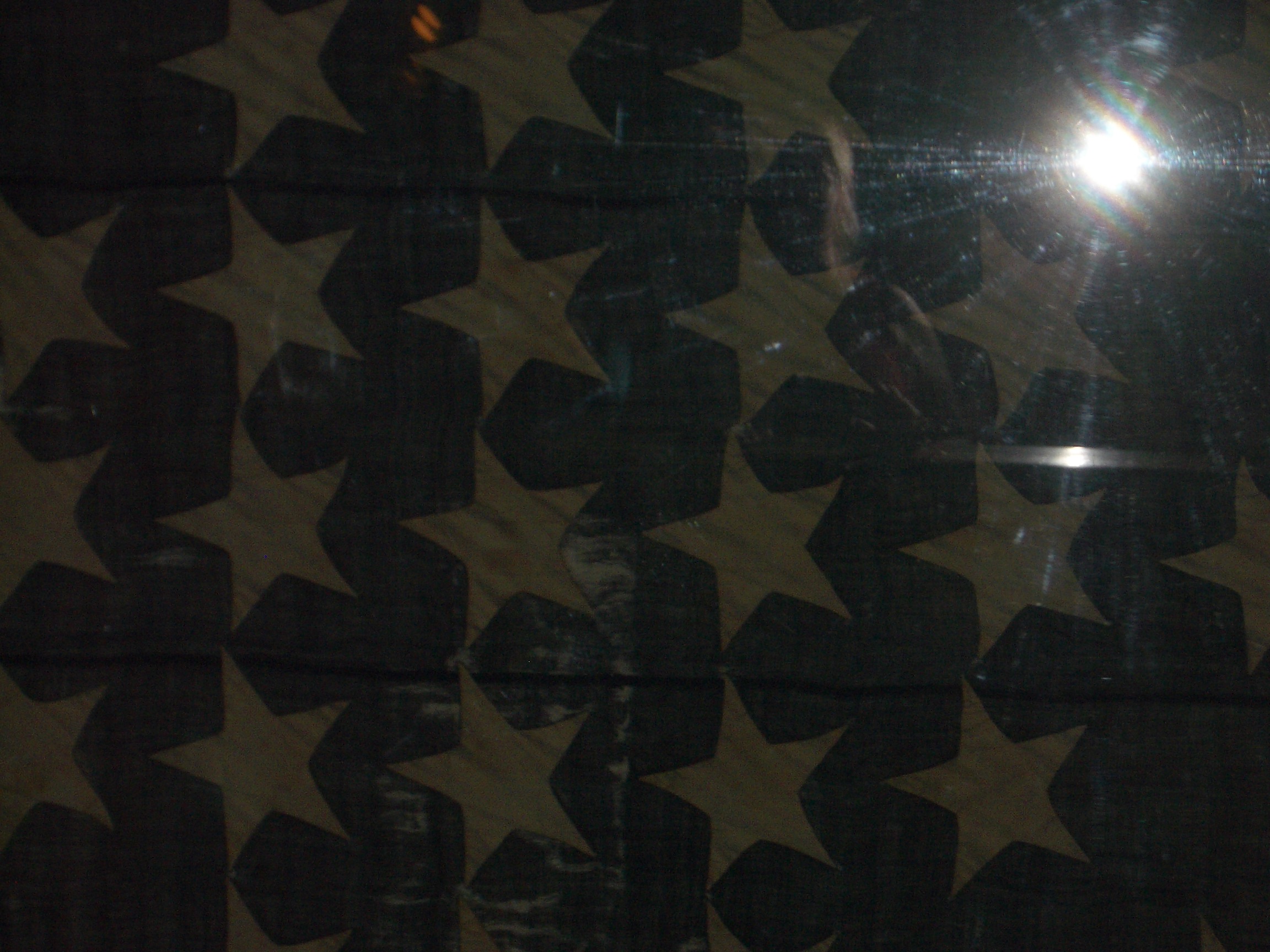
The Museum also has the US Flag that Major Anderson flew during the battle and
ceremoniously lowered at the Surrender. The flag was taken to New York City and
flown downtown during the duration of the War. When Sumter was returned to the
Federal forces, Major Anderson returned to officially resume Union control, he
raised the same
flag again over the Harbour !
The Face in the Flag !!!
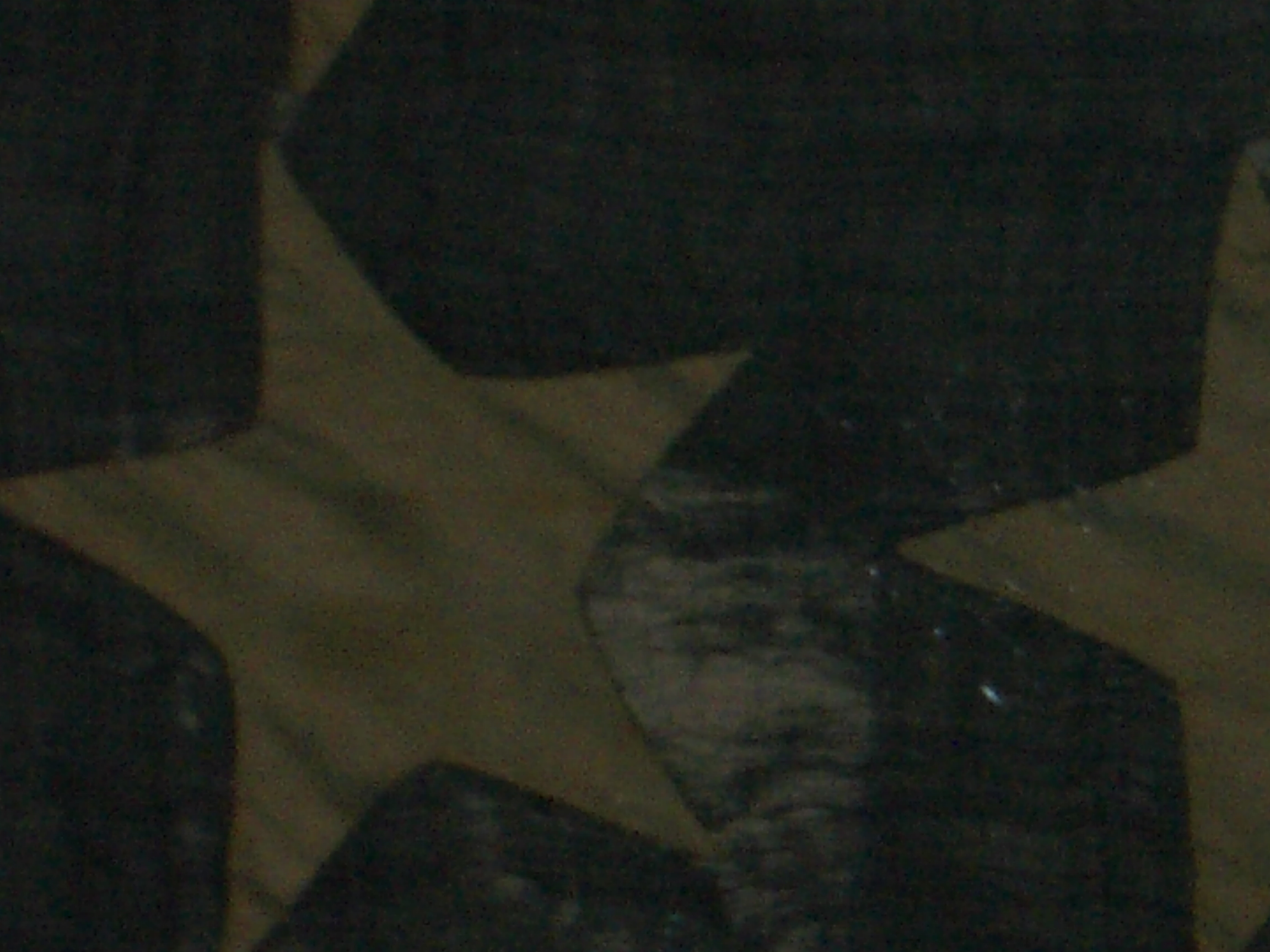
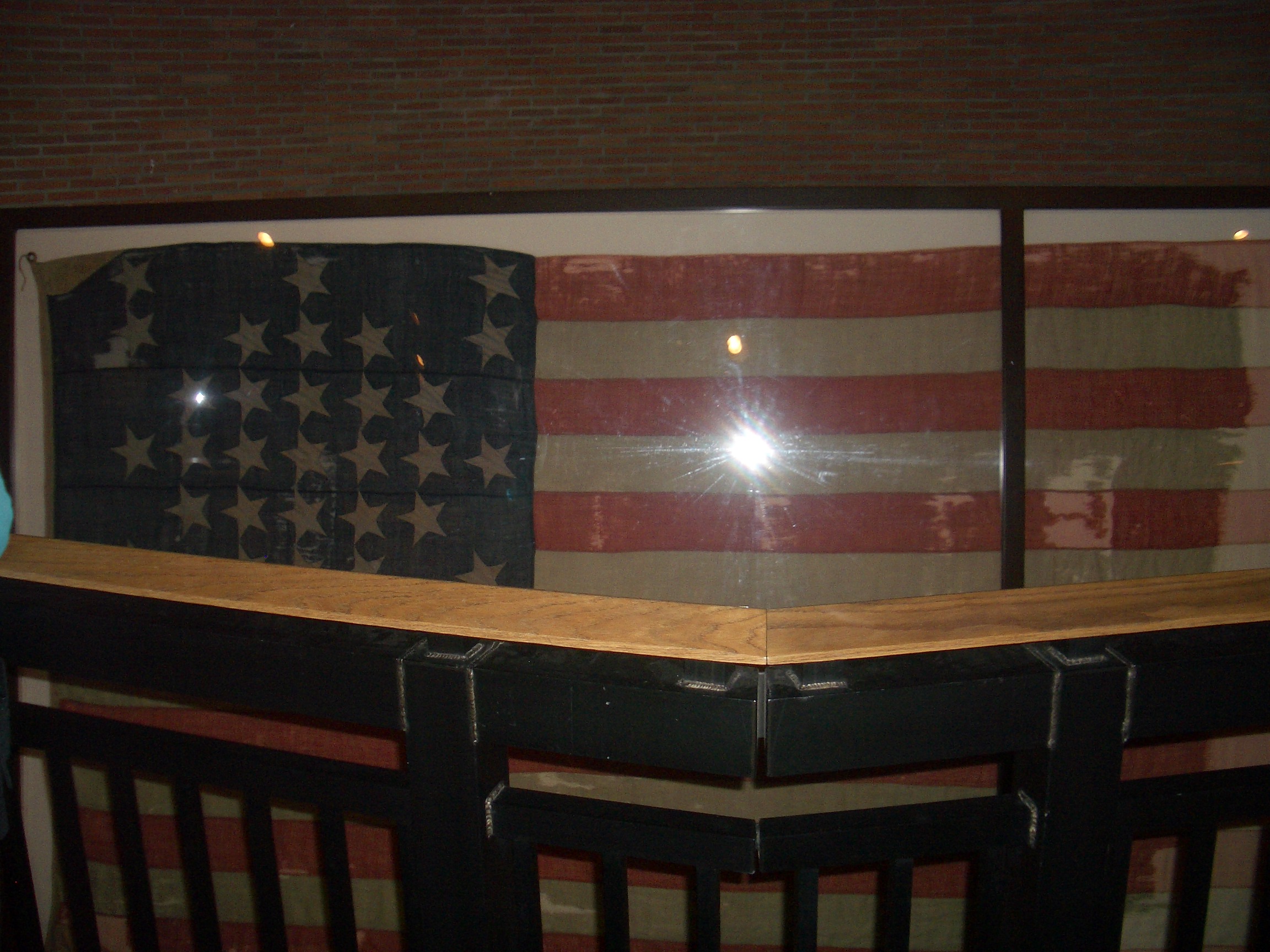
After the War the Flag grew tattered and was "retired" to a store room. When the
Flag was unrolled to be displayed in the Museum, the flag had faded with a very
strange pattern, you can very clearly see a bearded face in the Flag !!! It is
very eerie, especially since it looks like a Civil War soldier !!!
Glory !! The Story of the 54th Massachusetts
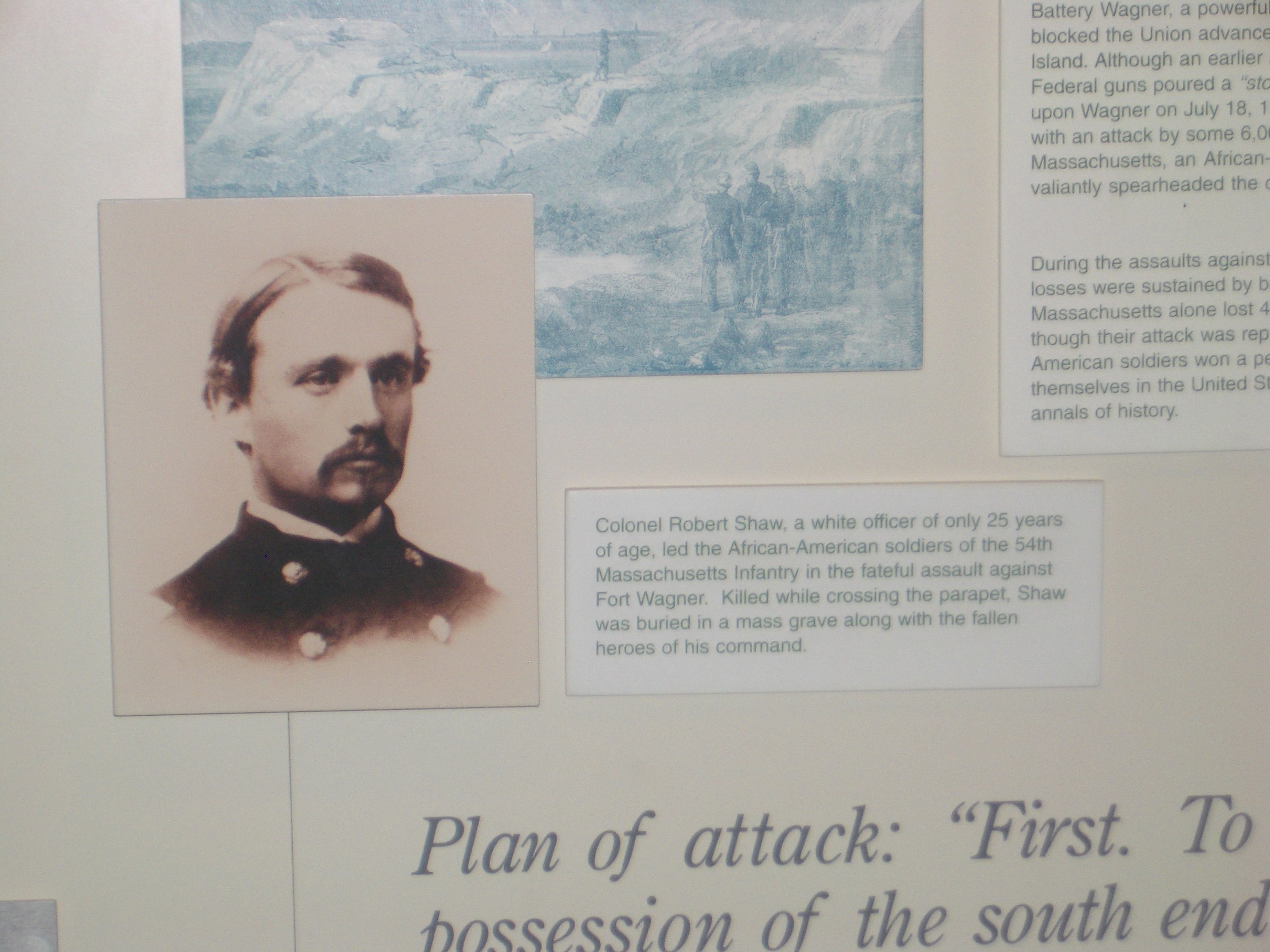
Right of Ft. Sumter is a Sand Bar that during the Civil
War had a perimeter defense for the Confederacy known as Fort Wagner. This Fort
was "glorified" in a epic scene in a story about the first African-American
Regiment in the Union Army, the 54th Massachusetts dramatized in the
movie, Glory !!
The 54th Massachusetts Regiment was organized in
March 1863 by the Governor of Massachusetts, John A. Andrew. Commanded by
Colonel Robert Gould Shaw, it sprang to life after the passage of the
Emancipation Proclamation. Secretary of War Edwin M. Stanton decided white
officers would be in charge of all "colored" units, and Colonel Shaw was hand
picked by Governor John Andrew.. Many of these officers were of abolitionist
families and several were chosen by Governor Andrew himself. Twenty four of the
twenty-nine officers were veterans but only six had been previously
commissioned. Several were Harvard men. The 54th Massachusetts
was composed of primarily freed African-Americans, and a number of the recruits were from states
other than Massachusetts, with
several coming from Pennsylvania
and New York.
The 54th left Boston
to fight for the Union on May 28, 1863. It started off performing only manual labor.
The regiment gained notoriety in a raid on the town of
Darien, Georgia, after being ordered to loot and burn the
town by Col. James Montgomery. The 54th's participation in this raid was minimal
and reluctant. Colonel Shaw initially objected to what he called a "Satanic
action".
The regiment's first action took place in a skirmish with
Confederate troops on James Island, South Carolina, on July 16. The regiment
stopped a Confederate assault, losing 42 men in the process.
The regiment gained international fame on July 18, 1863, when it spearheaded an
assault on Fort Wagner
near Charleston, South Carolina.
At this battle, Colonel Shaw was killed. Another hundred and fifty-six were
wounded or captured. Although the Union was not able to
take and hold the fort, the 54th was widely acclaimed for its valor, and the
event helped encourage the further enlistment and mobilization of
African-American troops, a key development that President Abraham Lincoln once
noted as helping to secure the final victory.
Decades later, Sergeant William
Harvey Carney was awarded the Medal of Honor for grabbing the
US
flag as the flag bearer fell, carrying the flag to the enemy ramparts and back,
and saying "Boys, the old flag never touched the ground!" While other
African-Americans had since been granted the award, Carney's is the earliest
action for which the Medal of Honor was awarded to an African-American.!
Charleston from the Sumter Ramparts
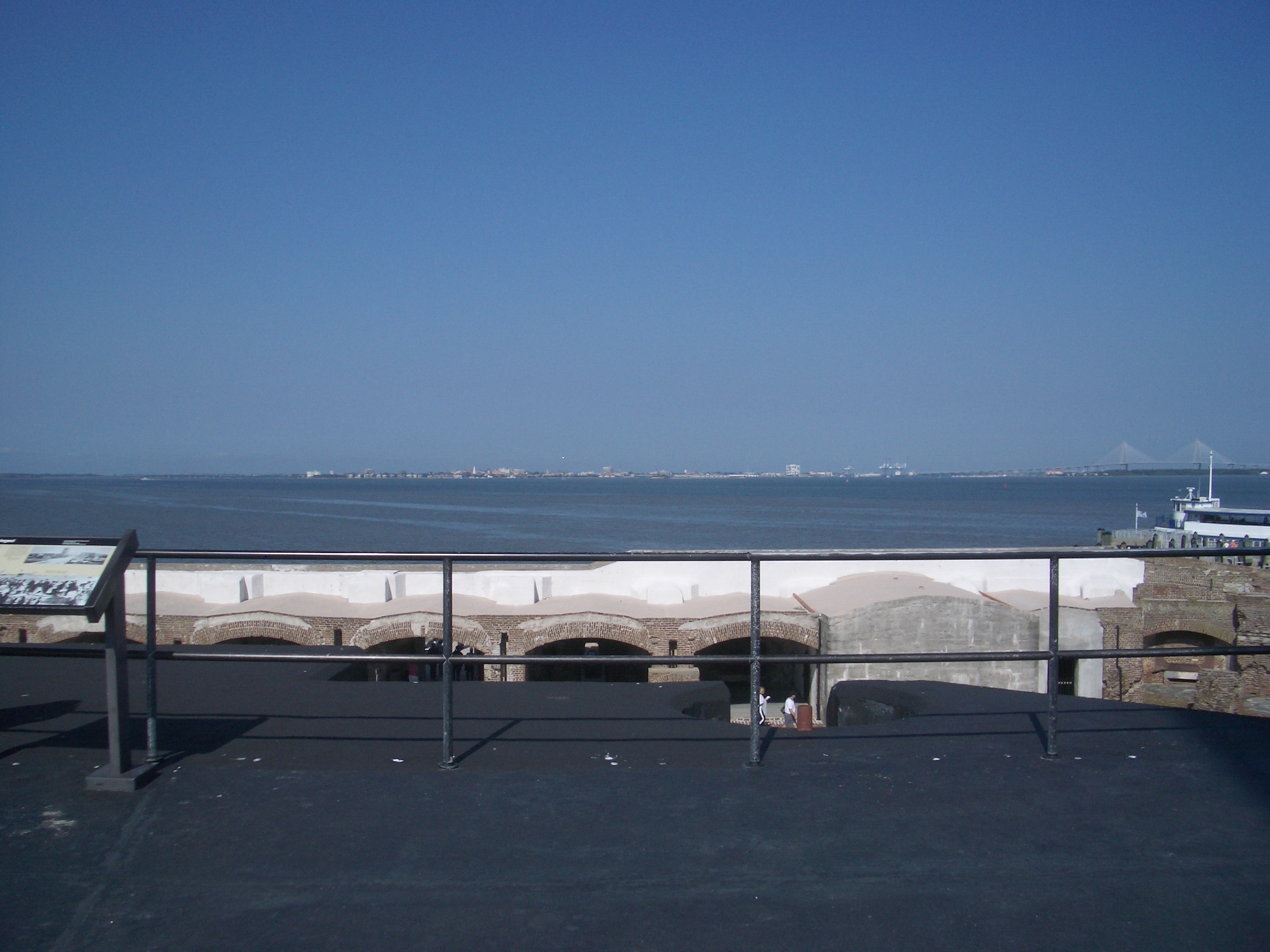
The National Park is very regimented about visits to Fort
Sumter, Each boatload of visitors is ushered onto the island, given the speech,
and then ushered off the Island exactly one hour later, which was fine for Mike
and Bone, because they had been stagnant for too long and longed to hit the Road
!!!!
Specifically, Mike and Bone hit the road for the savannahs of Savannah !!
Heading south on US-17
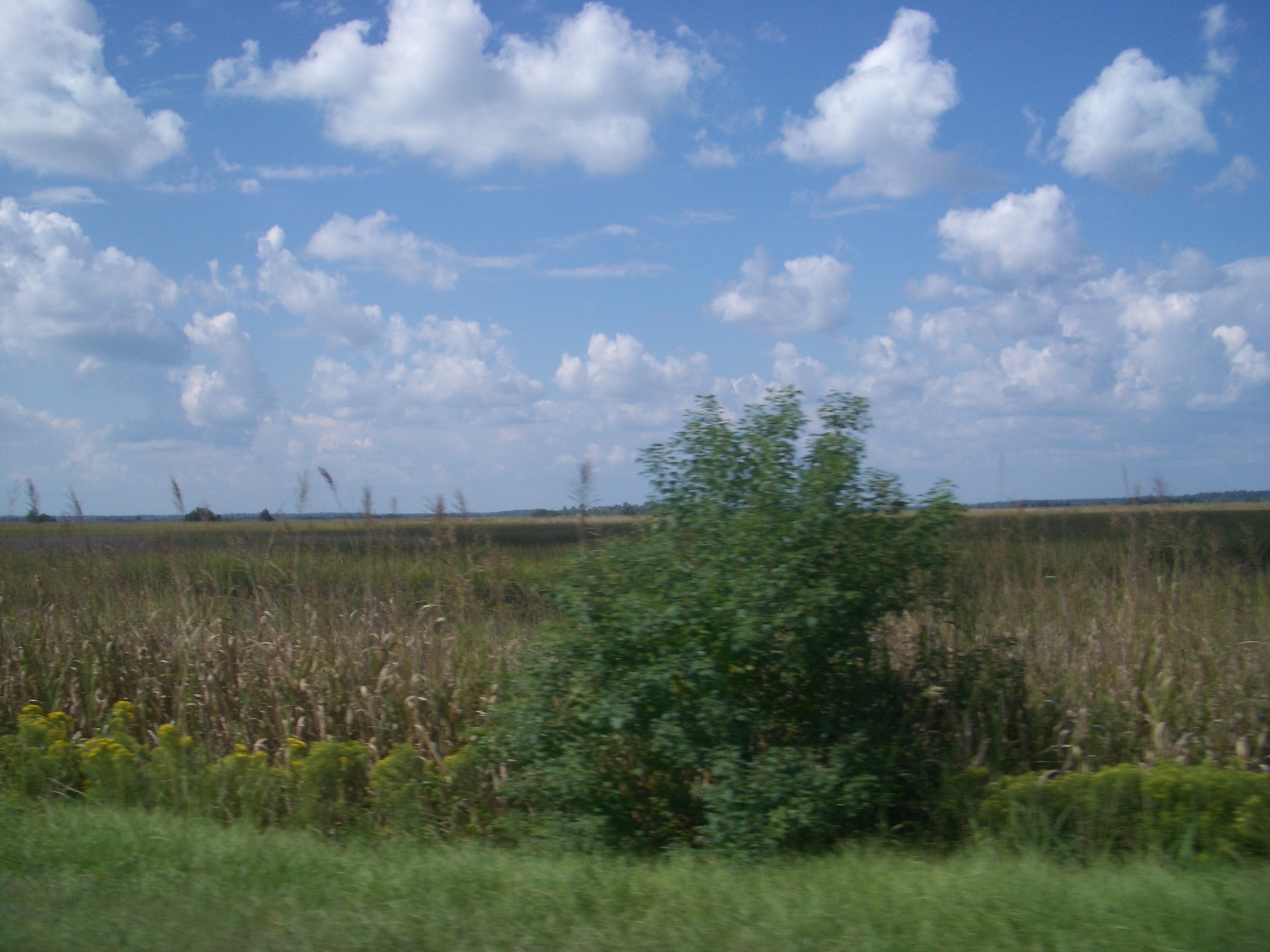
Swampy Southlands !
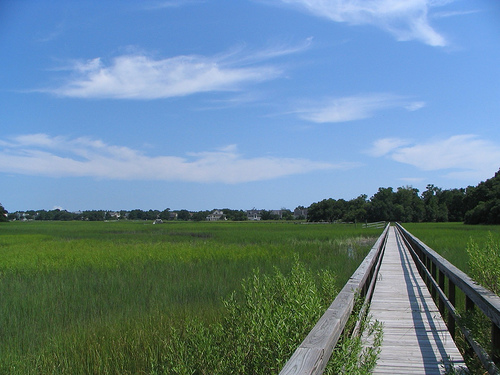
There is fact is a quite a bit a savannah between Charleston and Savannah,
better known as the Lowlands,certainly makes for a pretty drive.
Georgia on my Mind !!
Ray Charles
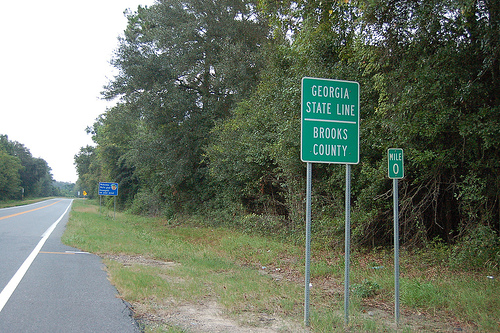
As the Boys crossed into Georgia, they entered their 12th
State of the Tour !!
The Boys Swanky Savannah Stay !!
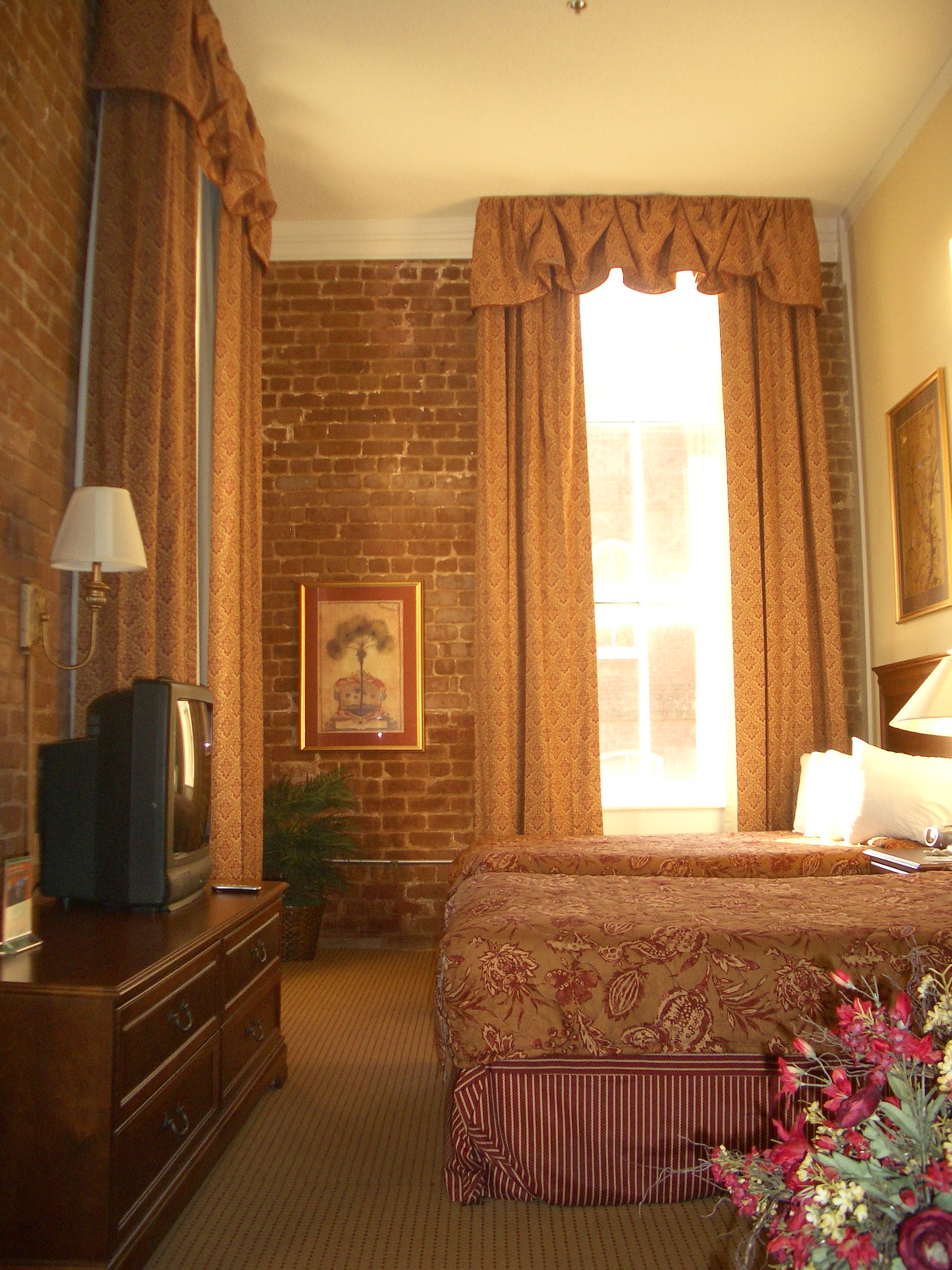
Within an hour of the
State Line Mike and Bone entered the eclectic town of Savannah !!!
Savannah,
established in 1733 was the first colonial and state capital of
Georgia, was founded by James Oglethorpe, as
the New World’s first planned city. For the purpose of
providing a refuge for persons who had become insolvent and for oppressed
Protestants on the continent, he proposed the settlement of a colony in
America
between Carolina and
Florida. He laid the groundwork for the colonization of
the state, proposing that it be colonized with debtors released from the
abominable conditions of England's
debtor's prisons.
Oglethorpe sailed for Charleston,
South Carolina on the ship Ann, arriving in
1732, and settled near the present site of Savannah,
Georgia. He negotiated
with the Creek tribe for land and established a series of defensive forts. He
then returned to England
and arranged to have slavery banned in Georgia.
Oglethorpe and his fellow trustees were granted a Royal Charter for the
Province
of Georgia between the
Savannah
and Altamaha rivers on June 9, 1732.
The city of Savannah,
Georgia,
U.S.A., was originally laid out in 1733 around
four open squares. The plan anticipated growth of the city and thus expansion of
the grid; additional squares were added during the eighteenth and nineteenth
centuries, and by 1851 there were twenty-four squares in the city. In the early
twentieth century, three of the squares were demolished or altered beyond
recognition, leaving twenty-one squares. (One of the three is currently being
reclaimed.) Most of Savannah's
squares are named in honor or in memory of a person or persons or a historical
event, and many contain monuments, markers, memorials, statues, plaques, and
other tributes.
Savannah
is now known as a wild party town due in part to its notorious past due to the
book Midnight in the Garden
of Good and Evil. Wanting some good
and some evil, they found some usually nice (for Mike and Bone) lodging for the
evening and headed into the city!
Afternoon in the Garden of Good and Evil
By the time Mike and Bone found
a quaint Hotel in the Historic District for the evening and had time to take a tour
in the hot, late afternoon. Wanting to get the "lay of the land"
but not wanting to walk in the merciless Sun , the Boys took a Trolley Tour
throughout the Historic Squares. As they drove through the beautiful homes, the
real story on the Trolley was all about that garden,,, the
Garden of Good, and Evil !!
Midnight
in the Garden
of Good and Evil is a work of
nonfiction by John Berendt, and became a New York Times bestseller. The Book is
atmospheric and Southern Gothic in tone, depicting a wide range of eccentric
Savannah
personalities.
The book's plot is based on real-life events that occurred in
the 1980s and is classified as nonfiction. The action that serves as a catalyst
in the book is the murder of Danny Hansford, a local gay hustler (characterized
as "a good time not yet had by all") by respected art dealer Jim Williams, an
event that resulted in four murder trials, all documented in the book. Hansford
and Williams were linked sexually, but the exact nature of their relationship
was unclear. The murder took place in Williams' home, originally built by an
ancestor of songwriter and Savannah
native Johnny Mercer.
The Book also highlights many other eccentric residents of
Savannah, most notably The Lady Chablis, a local drag
queen and entertainer.
Savannah at Night
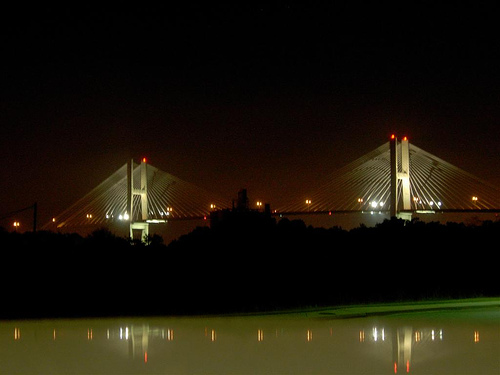
Getting back to their Hotel as the sun set, Mike and Bone
were ripe and thirsty for a
night of frivolity in the Party section of Savannah, or as David Byrne of the
Talking Heads would say "Take me to the River !!!"
Partying Savannah-Style
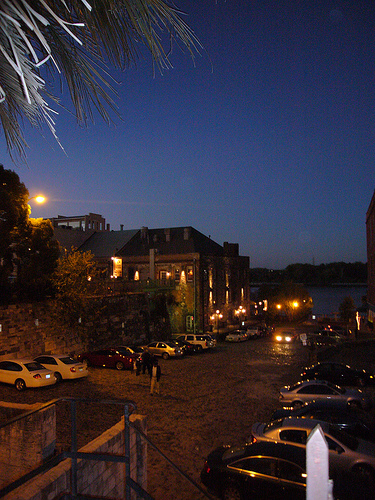
The Savannah Bar scene is down a pretty steep hill, down to
the River Level, there you will find block after block of bars and pubs.
Unfortunately many of them looked closed or boarded up like the district had
seen better days. Undaunted by the blight (heck these are two Detroiters !!)
they launched a Margie attack that continued what they had started the night before in
Charleston.
Romping on the River !!!
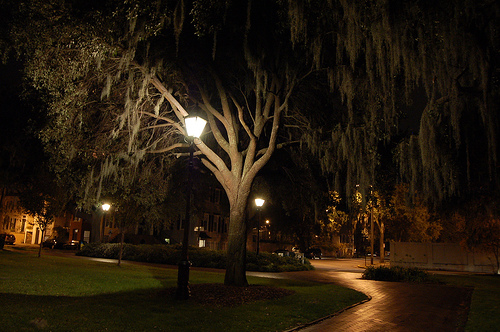
The Savannah Bar scene was pretty tame and lame compared to Charleston, but as ALWAYS,
Mike and Bone made the best of the situation! They still were able to drain
much of the Tequila in Savannah, and were inadvertently serenaded by a local
group of jazz musicians playing acapela. As it approached 1:00 in the morning
and what little scene there was appeared to be petering, they began to wander
back to their Hotel.
Late Nite-Pizza-Cap !!!
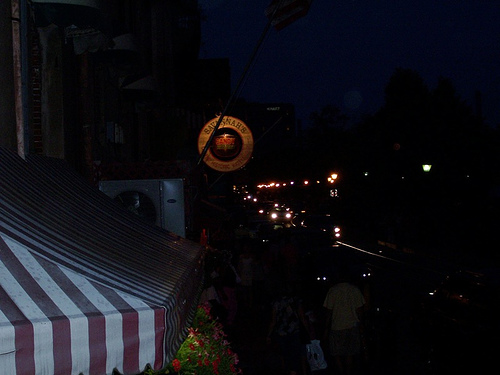
As Mike and Bone passed a small group of bars enroute to the
hotel, they were considering a nitecap, when this wonderful
smell overcame the Boys,,, the smell of mozzarella,, the pungent aroma of tomato
paste and pepperoni that coalesces into that magic, siren smell of Pizza !!!
Finding god pizza slices down South is as easy finding General Sherman
sympathizers !! But it was late, the Boys were under the influence, and darn if
those slices didn't smell good!! So at 1:30 AM they plopped into a outdoor pizza
joint, had a couple of slices and beers which they thoroughly enjoyed which
placed a proper finish to the day !!







